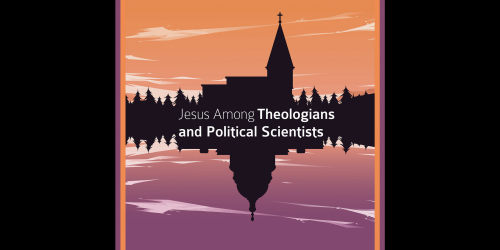
Illustration by Sarah Duvivier
The panel included Gary Wood (associate professor of Political Science, Andrews University), Marcella Myers (associate professor of Political Science, Andrews University) and Josh Faehner, (PhD student In Political Science, Wayne State University) and was chaired by John Reeve (assistant professor of Church History, director, PhD (Religion) and ThD programs, Andrews University Seminary).
Although it was advertised as a conversation consisting of theologians and political scientists, the moderator was the only theologian on the panel; however, Reeve noted that Section B was to include theologians on the panel discussion. Thus, this breakout session was really about Jesus among the political scientists. John Reeve started the session by setting the tone of the discussion regarding how we are to do politics as Christians. Using Ron Sider's book, Reeve suggested that this conference was about “fostering thoughtful, biblical and sophisticated political engagement.” Reeve left it to the panel to address the challenge of how to build a better approach to Christian politics, Adventist politics.
Gary Wood discussed the problems of politics on the philosophical level. Wood laments the fact that both the left and right have rejected the idea of Locke's separation of church and state. Wood gives a quick history of why Locke is essential. Locke's importance, demonstrated by Wood, is that we have rejected Lockean principles. Therefore, we have come to the place where both sides are rejecting not just separation of church and state but the natural law as well. This rejection leads both sides to end in relativism. On the conservative end of the spectrum, they declare that we have a specific right because we are humans or because it is in the Constitution. Therefore, reason can't tell us anything about morality. On the liberal side of the spectrum, they are constantly changing, altering their stance, because it is progressive, and desire to be on the right side of history. There is no grounding of positions except faith in that the future is better than the past.
The problem, Wood states, is the fact that reason and revelation are combining in morality towards other human beings. But it can only go so far; one can't give up every right. Even if there is unanimous consent, one can't give up the right to conscience. If you have no ground for morality, what do you have? The only thing left is just human will. Wood ends his address with the thought that we have a "dogmatic skepticism that leads to tyranny."
Marcella Myers builds on what Wood has said but wants to tackle politics more practically rather than philosophically. She wants to focus on humans rights and public policy. Justice of God, obligation to God, and temporal justice are not the same things. One needs to render to God and Ceasar, not just taxes but one's political lives as well. She desires to teach students to think about their responsibilities: how they treat others, and what policies they should adopt. Love thy neighbor; she described as loving the one who doesn't look like us. Religion becomes too significant in politics when people try to attain their religious goals through public policy. Politics should not be for specific people. What does religious liberty mean? It means that rules should not be applied only for the benefit of Christians because regulation could come back on us. It is essential to have underlying values as a Christian, but it also is necessary to articulate them in a secular way in the public sphere for other faiths to practice. Secular policy is not a specific denomination's work; consequently, policy needs to be secular. Separation of church and state is the only way to maintain democracy and our faith.
Josh Faehner took the conversation a different direction by not focusing on the separation of church and state or natural law, but from where does one get their vision for the “good.” He says that the attempt to access the “good” is well beyond opinion and needs philosophy and theology to aid in solving it. Therefore, political theology helps us see the “good.” One needs to turn to Scripture to access what the “good” is. To claim not to be political is a political claim. You are supporting it if you are not fighting against it. The problem with gleaning from Scripture is that there is a historical chasm. Because of this, one needs to focus on principle, not the policy, and then apply it. Faehner then gives some examples of how this would work, including the Imago Deias a foundation for equality, and the Sermon on the Mount as being full of principles to be applied in politics. His most fascinating example was using Leviticus' jubilee cycle as a principle for public policy. The jubilee cycle addressed the fact that prosperity appears to stack, and that wealth accumulates. The jubilee is therefore a political solution. This natural tendency for inequality has a check placed on it with the jubilee cycle. For their agrarian society, the essential “good” was land. In our day, could it be argued that healthcare and education would be that necessary “good” that needs restoration?
The question-answer period clarified how one defines the separation of church and state, correcting the notion that one should not be allowed to be Christian in the public sphere, and explaining that framers of the Constitution were hypocrites, but had sound principles about equality. There also was a constant encouragement that we need to take our responsibility to vote seriously and go vote. This responsibility especially needs action on the local level where our voice has more impact.
Nathaniel Gibbs is a former pastor currently pursuing a PhD at the Seventh-day Adventist Theological Seminary.